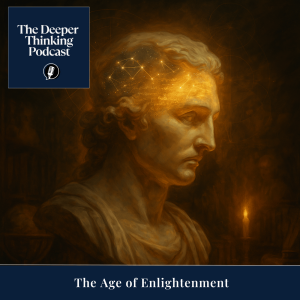
Thursday Mar 20, 2025
The Age of Enlightenment In The Algorithmic Age - The Deeper Thinking Podcast
The Age of Enlightenment
How reason reshaped the world—and why it remains incomplete.
The Enlightenment marked one of the most consequential intellectual transformations in history. It challenged divine right, religious orthodoxy, and inherited hierarchies—placing reason, inquiry, and autonomy at the centre of public life. But alongside its legacies of liberty and knowledge came contradictions: exclusion, domination, and a blind faith in progress. This episode traces the Enlightenment’s conceptual depth, its ethical tensions, and its echoes in today’s algorithmic age.
We explore the foundational debates between rationalism and empiricism, the countercurrents of Romanticism, and critical responses from thinkers like Edmund Burke and Friedrich Nietzsche. We ask: Was the Enlightenment a genuine pursuit of truth—or the construction of a new orthodoxy under the banner of reason?
Today, the legacy of the Enlightenment is contested. In an age of misinformation, polarization, and artificial intelligence, are we advancing its ideals—or distorting them? Is the dream of universal knowledge still viable? Or have we entered a digital counter-Enlightenment?
Reflections
- What does it mean to reason well, and who decides?
- Can Enlightenment values survive the erosion of public trust?
- Are today’s technologies continuing or replacing rational inquiry?
- What are the ethical limits of progress as a civilisational ideal?
Why Listen?
- Explore the philosophical roots of modern democracy and science
- Understand Enlightenment debates through historical and present lenses
- Engage with the tension between reason and emotion, liberty and control
- Reflect on whether Enlightenment is a finished era—or an unfinished task
Listen On:
Support This Work
If you'd like to support the ongoing work, you can visit buymeacoffee.com/thedeeperthinkingpodcast or leave a kind review on Apple Podcasts.
Bibliography
- Burke, Edmund. Reflections on the Revolution in France. Oxford: Oxford University Press, 2009.
- Descartes, René. Discourse on the Method. Translated by Ian Maclean. London: Penguin, 2003.
- Hume, David. An Enquiry Concerning Human Understanding. Oxford: Oxford University Press, 2007.
- Kant, Immanuel. Critique of Pure Reason. Translated by Paul Guyer and Allen W. Wood. Cambridge: Cambridge University Press, 1998.
- Locke, John. An Essay Concerning Human Understanding. London: Penguin, 1997.
- Montesquieu. The Spirit of the Laws. Translated by Anne M. Cohler et al. Cambridge: Cambridge University Press, 1989.
- Nietzsche, Friedrich. On the Genealogy of Morals. Translated by Walter Kaufmann. New York: Vintage, 1989.
- Robertson, Ritchie. The Enlightenment: The Pursuit of Happiness, 1680–1790. London: Allen Lane, 2020.
- Rousseau, Jean-Jacques. The Social Contract. Translated by Maurice Cranston. London: Penguin, 1968.
- Voltaire. Philosophical Letters. Translated by Ernest Dilworth. Indianapolis: Bobbs-Merrill, 1961.
- Pinker, Steven. Enlightenment Now: The Case for Reason, Science, Humanism, and Progress. New York: Viking, 2018.
- Nixey, Catherine. The Darkening Age: The Christian Destruction of the Classical World. Boston: Houghton Mifflin Harcourt, 2018.
The Enlightenment was never a single moment. It is a continuing question: how shall we live by light?
#Enlightenment #Philosophy #Reason #Democracy #Humanism #DigitalAge #TheDeeperThinkingPodcast
No comments yet. Be the first to say something!